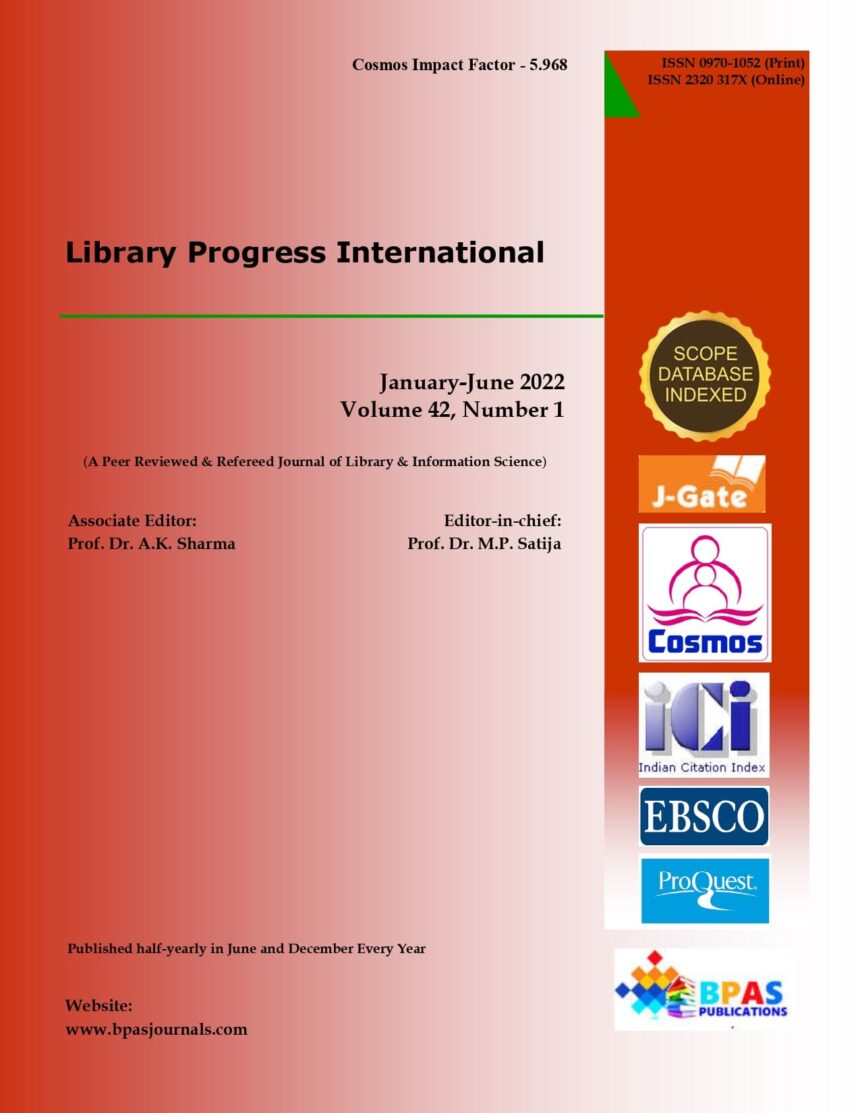Librarians’ Awareness, Positive Attitude and ICT Skills: A Panacea for Effective Services Delivery in the Fourth Industrial Revolution (4th IR) Era in Academic Libraries in Southern Nigeria
DOI:
https://doi.org/10.48165/Keywords:
Librarian, Awarenes, ICT Skills, Attitude, 4th Industrial Revolution, Academic Libraries, Service DeliveryAbstract
This study examined librarians’ awareness, positive attitude and ICT skills as panacea for effective services delivery in the Fourth Industrial Revolution (4th IR) era in academic libraries in Southern Nigeria. The total population for this study was eight hundred and forty-one (841) librarians from 84 university libraries in Southern Nigeria. The entire population was sample using total enumeration sampling technique because of the manageable size of population. Questionnaire was used to collect data from the respondents. The data collected for this study was analyzed using simple percentage/frequency counts and weighed mean. Findings from this study revealed that the extent of librarians awareness of the technological innovations associated with the 4th IR era is low. Also, it was shown that if librarians exhibit positive attitude towards embracing the 4th IR era technological advancement, they will be able to: Adapt to changing technologies associated with the 4th IR; Accept the shift from conventional service delivery to WWW based service delivery among others. Also, being in possessions of good ICT skills by librarians will to a very high extent facilitate effective library services delivery in the 4th IR era. The following were suggested to improve on librarians attitude to technological innovations of the 4th IR era and the acquisition of ICT skills among librarians: Librarians should develop flair for technological innovations which will help to activate in them the positive attitude required to effectively utilize the sophisticated technology associated with the 4th IR era and libraries/librarians should also abreast itself with the latest technologies to provide optimal services in minimum time through training, seminars, conferences and acquire and update the necessary ICT skills that is required to remain relevant in the 4th IR era and the accompanying changes it has brought to the educational sector and the library in particular.
Downloads
References
Ahmat, M. A., & Hanipal, R. A. A. (2018). Preparing the libraries for the fourth industrial revolution (4th IR). Jurnal PPM: Journal of Malaysian Librarians, 12, 53-64.
Christensen, C. M., & Overdorf, M. (2000). Meeting the challenge of disruptive change. Harvard business review, 78(2), 66-77.
Cronje, J. (2018). The 4th industrial revolution & library practices in South Africa. Retrieved from www.uj.ac.za/newandevents/Pages/The- 4th-Industrial-Revolution-Library-Practices-in South-Africa.aspx
Fabunmi, O. M., & Asubiojo, B. O. (2013). Awareness and use of online public access catalogue by students of Obafemi Awolowo University, Ile-Ife, Nigeria. Library Philosophy and Practice (e-journal). Retrieved from http://digitalcommons.unl.edu/libphilprac/922
Fati, O. I., & Adetimirin, A. (2017). Influence of computer literacy skills on OPAC use by undergraduates in two universities in Nigeria. International Journal of Academic Library and Information Science. 5(1), 27-37, DOI: 10.14662/IJALIS2017.002.
Fibrich, N. (2017). Libraries and their place in the fourth industrial revolution. Blog of Library Training Services Australia. Retrieved http://blog.ltsa.edu.au/libraries-and-their-place-in-the fourth-industrial-revolution
Hussain, A. (2019). Industrial revolution 4.0: Implication to libraries and librarians. Library Hi Tech News, DOI: 10.1108/LHTN-05-2019-0033.
Jabur, N. (2019). What role might libraries play in the fourth industrial revolution? Journal of Information Studies and Technology, 2(6). Retrieved from://doi.org/10.5339/jist.2019.6 9. Lom, M., Pribyl, O. and Svitek, M. (2016). Industry 4.0 as a part of smart cities. 2016 Smart Cities Symposium Prague (SCSP). IEEE. doi: 10.1109/SCSP.2016.7501015
Manda, M. I., & Backhouse, J. (2017). Digital transformation for inclusive growth in South Africa: Challenges and opportunities in the 4th industrial revolution. 2nd African Conference on Information Science and Technology, Cape Town, South Africa
Marwala, T. (2019). Build libraries for the fourth industrial revolution. Retrieved from file:///E:/4th%20Industrial%20Revo/Build%20libraries%20for%20the%20fourth%20industri al%20revolution%20%E2%80%A2%20Voices360.html
Miller, D. (2015). Natural Language: The user interface for the fourth industrial revolution. Opus Research Report. Retrieved from http://marketing.artificial-solutions.com/rs/177- TDV970/images/201609%20Opus%20Natural%20Language%20The%20User%20Interface%2 0for%20the%20Fourth%20Insutrial%20Revolution.pdf
Nisha, F., & Naushad, A. P. M. (2011). The application and use of library intranet services at the Indian Institute of Technology, Delhi. Library Philosophy and Practice, 1-19. Retrieved from http://unllib.unl.edu/LPP/nisha-ali.htm.
Nwobu, B., Oyewole, O., & Apotiade, J. K. (2016). Computer self efficacy as correlate of on line public access catalogue use: a case study. Information Impact, 7(2), 15-26.
World Economic Forum. (2016). The future of jobs: Employment, skills and workforce strategy for the fourth industrial revolution. World Economic Forum, Geneva, Switzerland. Retrieved from http://www3.weforum.org/docs/WEF_Future_of_Jobs.pdf
Xu, M., David, J. M., & Kim, S. H. (2018). The fourth industrial revolution: Opportunities and Challenges. International Journal of Financial Research, 9(2), 90-95.

